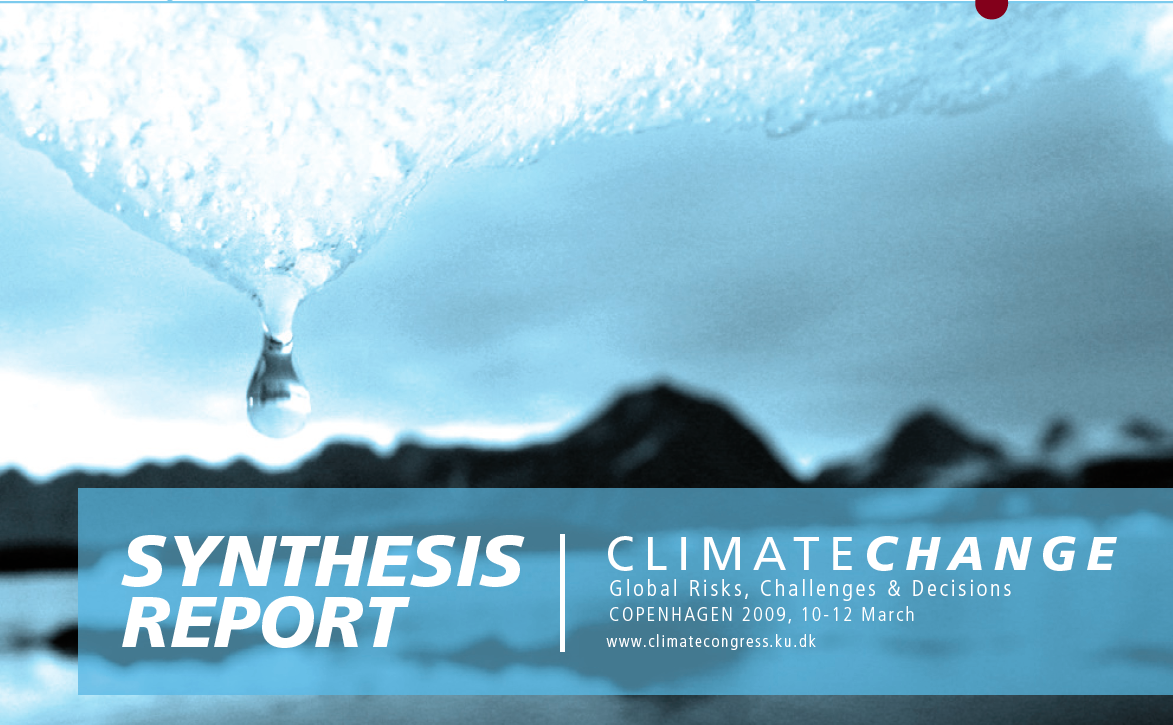The purpose of this report is to provide, for a broad range of audiences, an update of the newest understanding of climate change caused by human activities, the social and environmental implications of this change, and the options available for society to respond to the challenges posed by climate change.
Copenhagen 2009 Synthesis Report
A Warning From Copenhagen
Source: https://www.realclimate.org/index.php/archives/2009/06/a-warning-from-copenhagen
In March the biggest climate conference of the year took place in Copenhagen: 2500 participants from 80 countries, 1400 scientific presentations. Last week, the Synthesis Report of the Copenhagen Congress was handed over to the Danish Prime Minister Rasmussen in Brussels. Denmark will host the decisive round of negotiations on the new climate protection agreement this coming December.
The climate congress was organized by a “star alliance” of research universities: Copenhagen, Yale, Berkeley, Oxford, Cambridge, Tokyo, Beijing – to name a few. The Synthesis Report is the most important update of climate science since the 2007 IPCC report.
Synthesis Report
Source: PIK Potsdam – Download PDF or Download from OSS server.
This is the leading edge of assessment on trends and impacts as well as strategy, capabilities and warnings regarding delayed action:
Key Message 1: Climatic Trends
Recent observations show that greenhouse gas emissions and many aspects of the climate are changing near the upper boundary of the IPCC range of projections. Many key climate indicators are already moving beyond the patterns of natural variability within which contemporary society and economy have developed and thrived. These indicators include global mean surface temperature, sea-level rise, global ocean temperature, Arctic sea ice extent, ocean acidification, and extreme climatic events. With unabated emissions, many trends in climate will likely accelerate, leading to an increasing risk of abrupt or irreversible climatic shifts.
Key Message 2: Social and Environmental Disruption
The research community provides much information to support discussions on “dangerous climate change”. Recent observations show that societies and ecosystems are highly vulnerable to even modest levels of climate change, with poor nations and communities, ecosystem services and biodiversity particularly at risk. Temperature rises above 2C will be difficult for contemporary societies to cope with, and are likely to cause major societal and environmental disruptions through the rest of the century and beyond.
Key Message 3: Long-term strategy : Global Targets and Timetables
Rapid, sustained, and effective mitigation based on coordinated global and regional action is required to avoid “dangerous climate change” regardless of how it is defined. Weaker targets for 2020 increase the risk of serious impacts, including the crossing of tipping points, and make the task of meeting 2050 targets more difficult and costly. Setting a credible long-term price for carbon and the adoption of policies that promote energy efficiency and low-carbon technologies are central to effective mitigation.
Key Message 4: Equity Dimensions
Climate change is having, and will have, strongly differential effects on people within and between countries and regions, on this generation and future generations, and on human societies and the natural world. An effective, well-funded adaptation safety net is required for those people least capable of coping with climate change impacts, and equitable mitigation strategies are needed to protect the poor and most vulnerable. Tackling climate change should be seen as integral to the broader goals of enhancing socioeconomic development and equity throughout the world.
Key Message 5: Inaction is Inexcusable
Society already has many tools and approaches – economic, technological, behavioural, and managerial – to deal effectively with the climate change challenge. If these tools are not vigorously and widely implemented, adaptation to the unavoidable climate change and the societal transformation required to decarbonize economies will not be achieved. A wide range of benefits will flow from a concerted effort to achieve effective and rapid adaptation and mitigation. These include job growth in the sustainable energy sector; reductions in the health, social, economic and environmental costs of climate change; and the repair of ecosystems and revitalization of ecosystem services.
Key Message 6: Meeting the Challenge
If the societal transformation required to meet the climate change challenge is to be achieved, then a number of significant constraints must be overcome and critical opportunities seized. These include reducing inertia in social and economic systems; building on a growing public desire for governments to act on climate change; reducing activities that increase greenhouse gas emissions and reduce resilience (e.g. subsidies); and enabling the shifts from ineffective governance and weak institutions to innovative leadership in government, the private sector and civil society. Linking climate change with broader sustainable consumption and production concerns, human rights issues and democratic values is crucial for shifting societies towards more sustainable development pathways.

